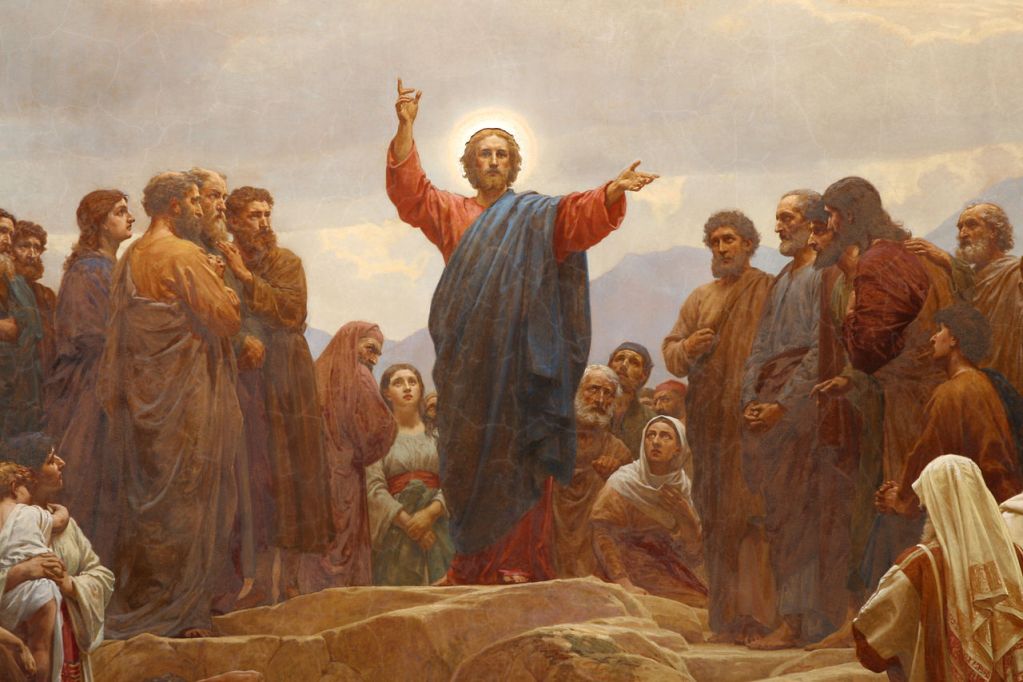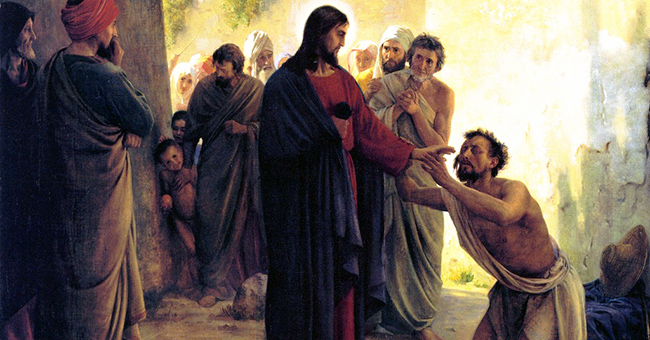Plain Talk About “Happiness”
Luke 6:17-26
Sixth Sunday after Epiphany
Analysis by Fred Niedner
17 [Jesus] came down with them and stood on a level place, with a great crowd of his disciples and a great multitude of people from all Judea, Jerusalem, and the coast of Tyre and Sidon. 18 They had come to hear him and to be healed of their diseases; and those who were troubled with unclean spirits were cured. 19 And all in the crowd were trying to touch him, for power came out from him and healed all of them.
20 Then he looked up at his disciples and said: “Blessed are you who are poor, for yours is the kingdom of God. 21 Blessed are you who are hungry now, for you will be filled. Blessed are you who weep now, for you will laugh. 22 Blessed are you when people hate you, and when they exclude you, revile you, and defame you on account of the Son of Man. 23 Rejoice in that day and leap for joy, for surely your reward is great in heaven; for that is what their ancestors did to the prophets.
24 “But woe to you who are rich, for you have received your consolation. 25 Woe to you who are full now, for you will be hungry. Woe to you who are laughing now, for you will mourn and weep. 26 Woe to you when all speak well of you, for that is what their ancestors did to the false prophets.”
 Daily we die as our phony comforts and paracletes fail us, but daily we rise, together, trusting that no matter what riches or poverty might snatch us up, we’re with Him, which makes this a day of blessing.
Daily we die as our phony comforts and paracletes fail us, but daily we rise, together, trusting that no matter what riches or poverty might snatch us up, we’re with Him, which makes this a day of blessing.
DIAGNOSIS: Adrift in the Madding Crowd
Step 1: Initial Diagnosis (External Problem): Poor Me, Jesus!
At first glance, it seems the great crowd of disciples along with the multitude from Jewish and Gentile cities who flock to Jesus for healing behave righteously and faithfully. They trust Jesus and go to him for aid and comfort. However, even without reading ahead to Jesus’ subsequent good news / bad news address to the disciples among them, we can perhaps diagnose something amiss among the throngs who mob Jesus. The Greek we translate as “crowd” is ochlos, a word that also means “molestation, disturbance, or trouble.” Moreover, this noun is the root of the verb Luke uses for how the unclean spirits “troubled” their victims. Enochleo, a variant of the simpler ochleo, means “to cause trouble,” and both forms come from ochlos. These people are trouble. But how?
We can’t psychologize them from this distance, but we can at least hypothesize that, if they’re like us, they come to Jesus with the same plea as the tempter back in Luke 4:9-13: “Leap from the temple’s heights, Jesus, and prove to us that God indeed protects the faithful no matter what, even as Psalm 91 boldly promises.” Leap over not only the Kidron Valley below the temple wall, but the valleys of cancer, COVID, and car accidents—this time with us on your backs. Save us from dying, Jesus, even if only for a few more days, months, or years. We ask only this small sign of your credentials and faithfulness toward us. Please. We beg you.
Step 2: Advanced Diagnosis (Internal Problem): In Our Hard-Earned Luck We Trust
“Happy and fortunate are you poor, starving, marginalized folks!” And “Woe to you rich, satiated, and celebrated souls!” said Jesus. There’s no inherent righteousness or virtue in poverty and starvation. Indeed, these give rise to temptations as deadly as wealth. Just ask Cain, who smoldered with murderous resentment as he scraped, scratched, and watched God ignore his offerings while showering his little brother with favor and abundance. Nor are wealth and a good name inherently wicked, although we so easily mistake them for signs that we have earned God’s favor in a way the poor and the legions of this world’s nobodies have not. Especially in a culture that lives by the creed that absolutely anything is possible for those who give their all to pursuing their dreams and passions, we find it easy to blame the failed and impoverished for steering their own lives into the ditch. And why should we care about those who don’t try hard enough? They have reaped what they sowed.
Step 3: Final Diagnosis (Eternal Problem): All Alone, Our Paraclete Leaked Away
Even if it’s true, it’s also easy and even cheap to conclude that resurrection and the ultimate dispensation of justice that grants paradise to the poor and condemns the rich to hellfire makes sense of Jesus’ beatitudes and threats. This makes a joke of creation’s goodness and the very notion that the one life each human has on this earth is a precious, meaningful gift that dare not be wasted. Rich-folk theology happily allows slaves to long for heaven even as they’re whipped or beaten to death. “Let ‘em dream!”
Luke’s is also the gospel in which Jesus tells the parable of the rich man and poor Lazarus. Lazarus had dogs for comforters, his pack of paracletes. The rich man had his wealth and his feasts for paraclesis (cf. Luke 6:24). He could have had a flesh-and-blood friend, but while he let Lazarus eat his garbage, he never once invited him in. And that, Jesus teaches, has eternal significance. The rich man wasted his life, making wealth his only comforter. In the end, rich and poor alike will mourn, weep, hunger for just a little more time, and finally lose everything—except for love and friendship. Those last forever. People who ultimately love and trust only wealth end up utterly abandoned. They have thrown away, forever and for nothing, the one life they’ll get on this planet.
PROGNOSIS: At Home in God’s Nation of Beggars
Step 4: Initial Prognosis (Eternal Solution): S***-Listed with the Son of Man
Should anyone care about those who found all their comfort in fickle, fleeting wealth? They have reaped what they sowed. To hell with them. Which is pretty much what the powerful said of Jesus with their mocking and reviling taunts as he hung on the cross stripped of everything. “He saved others, let him save himself!” (Luke 23:35).
Then one more person came seeking his power, such as it was. “Remember me, mighty king of the condemned! You’re all I have now.” And Jesus responded, maybe to the man alone, maybe to all the world, “He’s with me! So blessed are you, my friend. Today already, this is Paradise, the Garden of Delight” (Luke 23:42-43). And so it was that the Son of Man who had no place to lay his head became the paraclete, the last friend standing (or hanging), with all who are stripped of every other comfort or defense. He alone, the parable-teller himself, on his own descent into God-forsakenness, could provide a sip of mercy to the lonely soul not even Lazarus could reach. No matter what s***-list (or porn-list; Luke 6:22) you might end up on, you’re still fortunate, among the blessed, because nobody has a bigger, more infamous s***-list than the Son of Man. When you’re on that list, he’ll never let you go. Lucky you. You always have at least one paraclete, one friend. Forever.
Step 5: Advanced Prognosis (Internal Solution): Trusting God When Luck and Fixes Fail
We still crowd around Jesus, troubled souls that we are, and we still beg for healing so we might live for at least another day. We still hope and sometimes pray for a fatted calf, but we’ll settle for a few herbs and loved ones with whom to share them. And the temptation to measure God’s faithfulness by whether our prayers get answered as we hope never leaves us, even as we still tend to take credit for our own good fortune and blame the poor for not being so clever and righteous as we are. Now, however, we hang out with those who publicly acknowledge their place on the ultimate s***-list of cunning, self-deceiving, broken, misguided troublemakers whose only hope and only true paraclete is that crucified guy, the Son of Man. Into his death we have been baptized, and as his resurrected body we now live. Daily we die as our phony comforts and paracletes fail us, but daily we rise, together, trusting that no matter what riches or poverty might snatch us up, we’re with Him, which makes this a day of blessing.
Step 6: Final Prognosis (External Solution): Discards Weeping and Leaping for Joy
More than merely with him, we are his own resurrected flesh and blood on the loose in this world. Accordingly, we sing, laugh, and dance in the gutter with the s***-listers of all kinds, those whom the comfortable and prosperous blame for their own poverty and suffering, and also those clueless, beautifully coiffed but woebegone rich folk who think they made their own luck and their s*** doesn’t stink. Indeed, in many ways, this sorry old world is no more than a ditch full of woe, finger-pointing, and trouble. But our love for each other, not to mention the tears and laughter that accompany our songs, are infectious. The Son of Man wasn’t kidding when he said you can find the Garden of Eden even on Golgatha.




You must be logged in to post a comment.